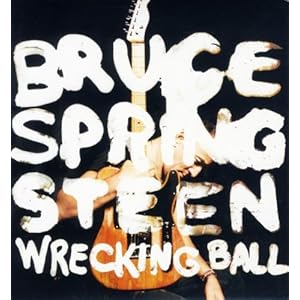 Given the career trajectory of any aging rocker, I suppose Bruce Springsteen’s ability to remain artistically and thematically relevant in his fifth decade of recording is a bit of an anomaly; actually, scratch that “aging rocker” thing, considering that it scarcely took, say, Maroon 5 ten years to sound like a faded Xerox of themselves. In reality, Bruce has endured complacency syndrome before. While 1982’s Nebraska worked precisely because of its stripped-down nature, and 1987’s Tunnel of Love was so excruciatingly personal that it succeeded without Bruce’s legendary E Street Band, subsequent attempts to leave his seasoned sidemen out of the loop have been hit or miss at best.
Given the career trajectory of any aging rocker, I suppose Bruce Springsteen’s ability to remain artistically and thematically relevant in his fifth decade of recording is a bit of an anomaly; actually, scratch that “aging rocker” thing, considering that it scarcely took, say, Maroon 5 ten years to sound like a faded Xerox of themselves. In reality, Bruce has endured complacency syndrome before. While 1982’s Nebraska worked precisely because of its stripped-down nature, and 1987’s Tunnel of Love was so excruciatingly personal that it succeeded without Bruce’s legendary E Street Band, subsequent attempts to leave his seasoned sidemen out of the loop have been hit or miss at best.
This isn’t to knock Bruce as a solo artist; he’d be a magnetic performer with any band (or no band) behind him, and remains a compelling and prolific songwriter regardless of his cohorts. But it’s undeniable that there’s a wily, muscular synergy behind his E Street Band records that, generally speaking, his solo albums lack; his new album, Wrecking Ball, isn’t really the type of record that requires that level of energy, but there are instances afoot where it would certainly help.
Steeped deeper in the Pete Seeger dustbowl folk of We Shall Overcome than perhaps any other album of Boss-penned songs, Wrecking Ball has stylistic flourishes and hard lefts to spare, but is largely constructed around a skeleton of rustic Americana. It’s appropriately Depression-era, given that Bruce devotes the lion’s share of his lyrics to the current financial crisis; this is the Great Recession, done up Bruce-style, and if Wrecking Ball doesn’t quite pop the way Bruce’s best E Street records have, his intentions are admirable, and his milieu of choice smartly executed. Shuffling country and whooping worksongs inform the framework of “Easy Money” and “Shackled & Drawn”; 99 percenters are forced into Old West Robin Hood tactics out of anger and necessity, but these songs stomp and holler, rowdily scoring the revolution. “Death to My Hometown” and the title track traffic in lurching, keening Irish folk-rock, appropriately working-class and resilient. (“Wrecking Ball”, in particular, stands in the path of impending bulldozers with middle finger extended, calling out their operators’ testicular fortitude.)
It’s a fairly strong batch of songs, to be sure. First single “We Take Care of Our Own” might, musically speaking, be the weakest track here, but it deserves kudos for setting its vitriolic satire of crooked financiers and the conservative pundits who support them to a chest-thumping, flag-waving instrumental that immediately sounds like the sort of jingoistic anthem he was accused of back when people weren’t actually listening to the words of “Born in the U.S.A.” (Shades of that record all around, really, and I think that a sizable portion of fans are eagerly awaiting the day that a blissfully unaware Rick Santorum strides out onto a stage to its ironic strains.) Wrecking Ball is far from bad – it’s quality material wall to wall, really – but the execution often drags. For a man who’s built on career on galvanizing, yearning, incredibly memorable songs, that’s a bit of a letdown; melodies don’t quite embed themselves, and only a few real highlights emerge at albums’ end.
Among these is “This Depression”, which illustrates just how potent Bruce’s simmer truly is; minor-key and mournful, it’s a solemn reflection of devotion in the face of overwhelming odds, a pet subject of Bruce’s since the advent of his career. It’s a stunning display, and is only trumped by the forceful, hopeful “Land of Hope and Dreams”, an E Street Band live favorite finally available in studio form; the version itself doesn’t quite best the only previous version available on official wax (a heart-stopping, passionate reading on 2001’s Live in New York City), but it’s nice to hear this finally committed to an album (and such a thematically appropriate one), and there are flourishes – some new instrumentation, a disembodied chorale of ghostly voices – that keep things interesting. (This also serves as a fitting epitaph for longtime E Street Band saxophonist Clarence Clemons, Bruce’s second-in-command who, sadly, passed on last year after a stroke; it’s nice, too, to see the Big Man paid tribute to on record in the classiest way possible.)
At the end of the day, Wrecking Ball is a fine album. It’s often par for the course as far as latter-day Springsteen goes, but it’s admirably restrained, and built around Bruce’s unshakable, often contagious sense of conviction. Combining this clarity and focus of vision with the bristling musical energy of the E Street Band would bode well for future records; still, there’s something to be said about a performer who manages rebellious, intermittently exciting music, even as he approaches senior citizenship. Regardless of quality, the concept of a 62-year-old artist still absorbing new and compelling influences should serve as an inspiration to upstart bands that settle into “safe” territory before their debut finishes spinning.
Grade: B+
